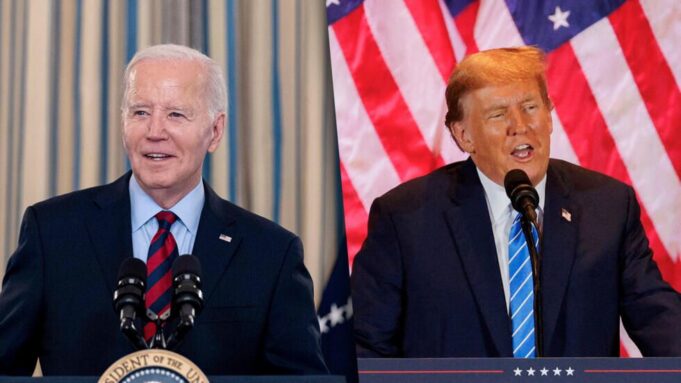United States President Joe Biden and his predecessor, Donald Trump, won enough delegates on Tuesday, March 12, to clinch their party nominations in the 2024 presidential election.
The results in four statewide elections on Tuesday, the latest in the months-long march to determine the Democratic and Republican party flagbearers, were essentially a foregone conclusion as incumbent Biden and former president Trump had already seen off all primary challengers.
Biden crossed the threshold of 1,968 delegates needed when he won Georgia – a U.S. swing state where Trump faces trial over an alleged conspiracy to steal the last election.
Trump’s victory in Washington helped him secure the 1,215 delegates needed to earn the Republican nomination – and to propel him and his Make America Great Again movement back into the cauldron of a presidential race.
As the pair now head for a rematch of their 2020 showdown, Biden laid into his challenger in a statement.
“I am honored that the broad coalition of voters representing the rich diversity of the Democratic Party across the country have put their faith in me once again to lead our party – and our country – in a moment when the threat Trump poses is greater than ever,” the president said.
Trump: I’ll free U.S. Capitol rioters if reelected
Georgia, Mississippi, Washington and Hawaii – the Pacific island state where polls were to close hours later on Tuesday – were offering a combined 161 delegates on the Republican side, and unopposed Trump needed 137 of those to put the race mathematically beyond reach.
Trump’s remarkable sweep of nearly all GOP state primaries to date led him to essentially secure the nomination far earlier than most candidates in previous campaigns, and it assures an extremely lengthy, nearly eight-month slog for the White House being contested by the two oldest men ever to begin their presidencies.
Trump is campaigning on sweeping reform of what he calls Biden’s “horror show” immigration policies, despite successfully pressuring Republicans to block the toughest package of border security negotiated in Congress for decades.
The issue has become a flashpoint in Georgia – which was long reliably Republican but has become more competitive and is now seen as crucial to any candidate’s White House ambitions – due to the recent murder of nursing student Laken Riley, allegedly by an undocumented migrant.
The contests have renewed scrutiny of Trump’s effort to overturn the 2020 election in Georgia – a state he lost to Biden by fewer than 12,000 votes – as he gears up for a third White House run.
The push led to one of the four indictments he faces, setting the stage for a year of unprecedented drama as the 77-year-old tries to juggle multiple court appearances and another election campaign.
The first Republican presidential candidate to lose Georgia in almost three decades, Trump claimed foul play but several recounts and numerous lawsuits failed to turn up any evidence of significant voter fraud anywhere in the country.
The former president – who denies all wrongdoing – is being prosecuted under Georgia’s Racketeer Influenced and Corrupt Organisations (RICO) statute, which is usually used to nail down mob figures.
On the Democratic side, 81-year-old Biden picked up the U.S.-held Northern Mariana Islands Tuesday and was on the primary ballots in three mainland states – Georgia, Mississippi, and Washington – as well as in the “Democrats Abroad” grouping, according to AFP.
As with most incumbents, he has faced a relaxed primary season – easily seeing off two candidates who have consistently polled in single digits.
But he does face concerns about his age as well as low approval ratings, elements Trump’s team has sought to seize on during the campaign.
- Meet 2 Anthony Joshua’s ‘closest friends’ who died in Ogun accident - December 30, 2025
- Funke Akindele’s ‘Behind The Scenes’ breaks N1.1bn box office record - December 30, 2025
- Forbes declares Beyonce fifth billionaire musician - December 30, 2025










